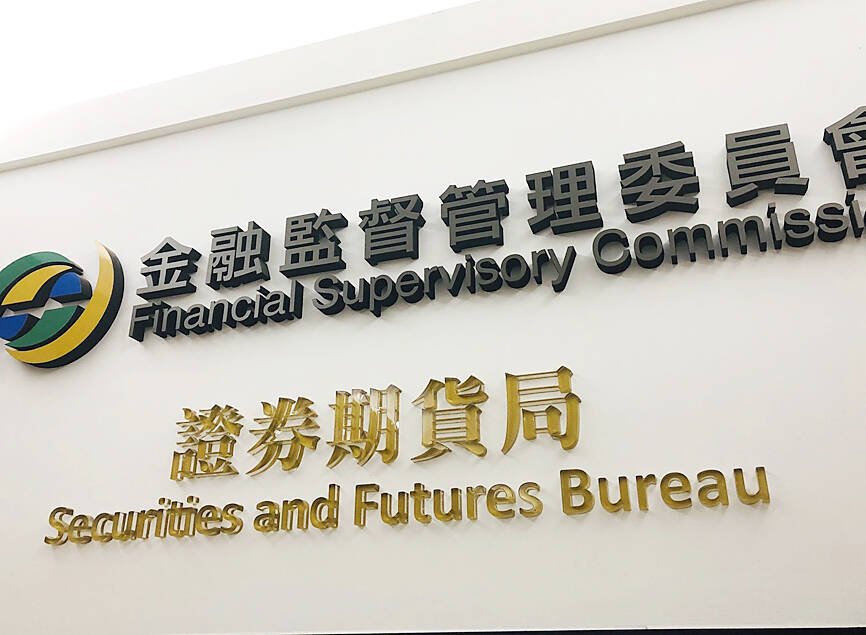The Financial Supervisory Commission (FSC) on Thursday said it would tighten regulation on securities investment consulting services using robot advisers, as it seeks to prevent manipulation and protect investors’ rights.
The commission said that it would talk with the Securities Investment Trust and Consulting Association to amend the Regulations Governing Securities Investment Consulting Enterprises (證券投資顧問事業管理規則).
The commission said it is planning to increase the maximum fine for malpractice at companies in the sector to NT$15 million (US$489,205) from NT$3.6 million.

Photo: Kelson Wang, Taipei Times
It said it would also launch a review of robot advisory algorithms to assess their investment terms, their ability to react to changes in the market and whether employees at the firms can manipulate the results.
Companies have so far been allowed to self-regulate their algorithms, but an expert panel would be set up to conduct reviews, it said.
As of the end of last month, robot advisers managed funds totaling NT$6.9 billion, up 42 percent from a year earlier, with 167,000 investors using the services, up 17 percent annually, Securities and Futures Bureau data showed.
Sixteen financial firms offered automated portfolio advisory, the data showed.
The top three service providers are Cathay United Bank (國泰世華銀行) with asset under management of NT$1.87 billion, First Commercial Bank (第一銀行) with NT$1.5 billion and Hua Nan Commercial Bank (華南銀行) with NT$700 million, the data showed.

Taiwan Semiconductor Manufacturing Co (TSMC, 台積電) would not produce its most advanced technologies in the US next year, Minister of Economic Affairs J.W. Kuo (郭智輝) said yesterday. Kuo made the comment during an appearance at the legislature, hours after the chipmaker announced that it would invest an additional US$100 billion to expand its manufacturing operations in the US. Asked by Taiwan People’s Party Legislator-at-large Chang Chi-kai (張啟楷) if TSMC would allow its most advanced technologies, the yet-to-be-released 2-nanometer and 1.6-nanometer processes, to go to the US in the near term, Kuo denied it. TSMC recently opened its first US factory, which produces 4-nanometer

PROTECTION: The investigation, which takes aim at exporters such as Canada, Germany and Brazil, came days after Trump unveiled tariff hikes on steel and aluminum products US President Donald Trump on Saturday ordered a probe into potential tariffs on lumber imports — a move threatening to stoke trade tensions — while also pushing for a domestic supply boost. Trump signed an executive order instructing US Secretary of Commerce Howard Lutnick to begin an investigation “to determine the effects on the national security of imports of timber, lumber and their derivative products.” The study might result in new tariffs being imposed, which would pile on top of existing levies. The investigation takes aim at exporters like Canada, Germany and Brazil, with White House officials earlier accusing these economies of

Teleperformance SE, the largest call-center operator in the world, is rolling out an artificial intelligence (AI) system that softens English-speaking Indian workers’ accents in real time in a move the company claims would make them more understandable. The technology, called accent translation, coupled with background noise cancelation, is being deployed in call centers in India, where workers provide customer support to some of Teleperformance’s international clients. The company provides outsourced customer support and content moderation to global companies including Apple Inc, ByteDance Ltd’s (字節跳動) TikTok and Samsung Electronics Co Ltd. “When you have an Indian agent on the line, sometimes it’s hard

‘SACRED MOUNTAIN’: The chipmaker can form joint ventures abroad, except in China, but like other firms, it needs government approval for large investments Taiwan Semiconductor Manufacturing Co (TSMC, 台積電) needs government permission for any overseas joint ventures (JVs), but there are no restrictions on making the most advanced chips overseas other than for China, Minister of Economic Affairs J.W. Kuo (郭智輝) said yesterday. US media have said that TSMC, the world’s largest contract chipmaker and a major supplier to companies such as Apple Inc and Nvidia Corp, has been in talks for a stake in Intel Corp. Neither company has confirmed the talks, but US President Donald Trump has accused Taiwan of taking away the US’ semiconductor business and said he wants the industry back